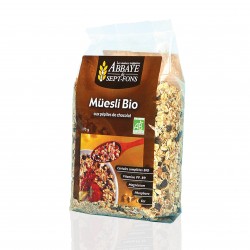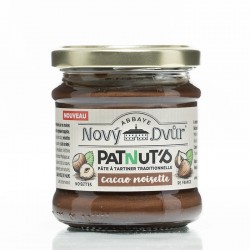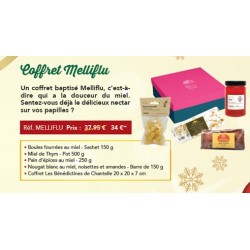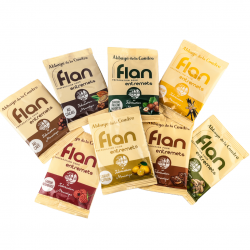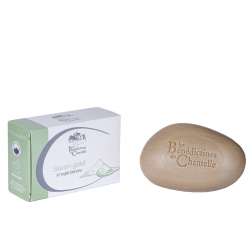Organic Grape Muesli
Supplier: Trappe mill - Sept Fons Abbey
Ingredients: Ingredients: Whole grain flakes * (69%) (oats, wheat, rye, barley, rice); raisins * (19%); apple cubes *; * soy flakes (non-GMO).
* Ingredient of agricultural origin from EU and non-EU organic farming: 100%
May contain: Possible traces of hazelnut, sesame and celery.
Average nutritional value per 100g
Energy (kJ) / (kcal): 1510/358
Fat (g): 3.8
of which saturated fatty acids (g): 0.5
Carbohydrates (g): 67
of which sugars (g): 26
Protein (g): 8.5
Salt (g): 0.1
Net Weight: 375g
Made in France
Live in the earth and stay faithful
a reflection on the nature of monastic work in Sept-Fons by Dom Patrick Olive, father abbot of Sept-Fons
From their origins and to be faithful to the Rule of Saint Benedict (ch. 48), the Cistercians wanted to work the land they lived in and they knew how to create the conditions necessary to achieve this (institution of lay brothers, creation of barns, etc. …), They thus gave us useful indications to guide both our reflection and our action today.
The first donors, at the time of the foundation of the Abbey of Sept-Fons (1132), were generous at little cost and the land where the monastery settled was mainly swamps and former branches of the Loire mainly made of sand. The monks have, over the centuries, altered these lands and they have also rounded their property by adding richer and more fertile soils. Until the end of the 19th century, they lived exclusively on agriculture and animal husbandry and, from around 1850, they passed for "model farmers", a reputation (partly justified) which they kept for more. of a century.
However, during this same period, they had to add to agriculture (proper cultivation, breeding, orchard and vegetable patch) another artisanal (and almost industrial) activity to ensure sufficient income for the community. First there was a Brasserie (resounding and costly failure), a grain mill, then Germalyne (processing of wheat germ) and its derivatives, and finally jam.
However, agricultural activity has not ceased and we still continue to cultivate the land to sell the product or for consumption by dairy farming whose product is transformed into cheese by a local artisan.
This history and its evolution were not the response to a theoretical reflection on the relationship between monks and their environment but rather a kind of pragmatism, a reaction of common sense (or who believed it to be such, in certain cases) to do faced with a very prosaic situation: to support a large community of men who had chosen a certain way of life and wished to remain faithful to it.
For a long time, and in a well-documented manner from the second half of the 19th century, working the land was “naturally” part of the life of the monks of Sept-Fons. They were numerous (almost a hundred) and therefore provided a staff available for often arduous and tedious work (haymaking, stripping of beets, harvest of potatoes etc ... always carried out, at the time, in woolen clothes), especially before the onset of mechanization and even after. They also employed many local men (up to 30).
These works marked the rhythm of the days and the seasons, as Saint Benedict speaks of them (ch. 48). The monks thus resembled their peasant neighbors and one can hope that they drew, from this rhythm close to the earth, a wisdom, a calm and a real capacity for adaptation which was then very useful to them in their daily life in community.
When it became clear that we could no longer live primarily from this work on the land, the problem arose of how we were going to adapt. In Sept-Fons, the response was tentative and, at the beginning, very unsatisfactory (failed experience of the brewery). The Grain Mill, which worked for all the surroundings, was a more satisfactory answer and a sort of compromise between agriculture and crafts. However, it was not a sufficient answer and we had to look elsewhere.
In 1930, the creation of Germalyne (stabilized wheat germ) and its marketing were the “providential” response to this situation. We were at the beginning of the discovery of the "virtues" of vitamins and, after having succeeded in stabilizing the wheat germ, which is rich on this point, while retaining its virtues, the process was gradually improved then, around the 70s, then that the competition in this field became fierce, began the diversification: chocolate germ, then added to other plants and finally, in another register creation of jams.






